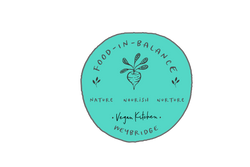Garden

The Food-in-Balance Garden is located at our suburban home in Weybridge, Surrey. For decades it has comprised of a traditional lawn area, with borders of perennial shrubs and bulbs, a rockery in one corner and a small vegetable patch. In more recent years the rockery area was inhabited by a small flock of hens, who zealously returned the area to bare soil, and two highly amusing Indian runner ducks. Following the Avian ‘flu pandemic in 2017 and a couple of devastating fox attacks, the heart-wrenching decision was made to re-home our beloved friends on a local farm. The rockery has since been replanted and attracts many bees, butterflies and ladybirds.
Towards the end of 2019, I began developing a project to evolve our garden into an ecologically thriving, high-yielding, enjoyable space, guided by the Principles of Permaculture. This is a long-term project, early in its conception, and we are learning as we go, but we are hopefully on an upwards trajectory. No pesticides are used, we are avid composters and our dream is to create a worm farm! The aim is to develop a garden which will inspire and, at least in part, supply the Food-in-Balance Vegan Kitchen.
Our planting scheme is evolving each year and includes a mixture of herbs, edible flowers, fruit and vegetables. This year, we are continuing to change the layout a little but are aiming for a similar variety and improved yield on some items. Last year was a bit of a slug nightmare and the birds swooped upon my laden cherry tree overnight!
In a typical year we plant:
Towards the end of 2019, I began developing a project to evolve our garden into an ecologically thriving, high-yielding, enjoyable space, guided by the Principles of Permaculture. This is a long-term project, early in its conception, and we are learning as we go, but we are hopefully on an upwards trajectory. No pesticides are used, we are avid composters and our dream is to create a worm farm! The aim is to develop a garden which will inspire and, at least in part, supply the Food-in-Balance Vegan Kitchen.
Our planting scheme is evolving each year and includes a mixture of herbs, edible flowers, fruit and vegetables. This year, we are continuing to change the layout a little but are aiming for a similar variety and improved yield on some items. Last year was a bit of a slug nightmare and the birds swooped upon my laden cherry tree overnight!
In a typical year we plant:
Vegetables: aubergines, chillies (five varieties), butternut squash, beetroot (heirloom varieties), runner beans, French beans, peas (two varieties), potatoes (three varieties), onions, shallots, cucumbers, radishes, sweetcorn (two varieties), cabbages, lettuces (several varieties), tomatoes (three varieties) and broad beans
Fruit: cherries, damsons, pears, apples (two varieties), strawberries, loganberries, rhubarb, raspberries
Herbs: rosemary, thyme (several varieties), loveage, chives (two varieties), sage, coriander, parsley, tarragon, marjoram, bay, echinacea
Flowers: too numerous to list but everything is planted to encourage bees and beneficial insects, heighten our senses and act as companion plants (e.g. marigolds and nasturtiums) to deter pests.
We also have a Cotswold Garden with several fruit trees – Victoria plums, Mirabelle plums, Bramley and Discovery apples and Conference pears.

